Elizabeth Vasquez from Stanford university is looking for stroke survivors to participate in her stroke recovery research project which aims to support people at home with a low cost physical rehabilitation solution.
Email: [email protected]
Sign Up: www.stanforduniversity.qualtrics.com
To take the survey follow this link https://elizabethvasquezresearch.weebly.com/“To be eligible you must:
● Speak English or Spanish
● Have had a stroke before the first COVID-19 lockdown in your town/city/etc
● Have trouble moving your hands, arms or legs because of the stroke
● Be 18 years of age or older
● Live in the U.S.A”
Highlights:
02:12 Introduction
10:44 Language issues
13:10 Dedication to helping others
13:31 The Ph.D. Project
16:51 How to get involved?
Transcription:
Elizabeth 0:00
And so the project is really all about being able to ask people what it is that they need. And then based off of that information of what people say that they need for specifically physical therapy, I want to be able to provide some sort of, at-home low-cost rehabilitative stroke technology.
Elizabeth 0:19
To help people so that they can get as much therapy as possible, regardless of their socioeconomic status, or how much money they have or if they’re in a rural area. So that’s kind of the long-term goal is to be able to create physically build something and then test it.
Elizabeth 0:35
So make sure that it’s like clinically valid. That’s the goal for the next three years. And so the first step of that is going to be this survey that I’m currently doing right now, which is what I am seeking participants for.
Intro 0:50
This is the recovery after stroke podcast, with Bill Gasiamis help helping you navigate recovery after stroke.
Bill 1:03
Hello, and welcome to recovery after stroke, a podcast full of answers, advice and practical tools for stroke survivors to help you take back your life after a stroke and build a stronger future.
Bill 1:15
I’m your host three time stroke survivor Bill Gasiamis. After my own life was turned upside down and I went from being an active father to being stuck in hospital. I knew if I wanted to get my life back to the life I loved the for my recovery was up to me.
Bill 1:30
After years of researching and discovering learn how to heal my brain and rebuild a healthier and happier life than I ever dreamed possible. And now I’ve made it my mission to empower other stroke survivors like you to recover faster, achieve your goals and take back the freedom you deserve.
Bill 1:45
If you enjoy this episode and want more resources, accessible training and a hands on support, check out my recovery after stroke membership community created especially for stroke survivors and caregivers. This is your clear pathway to transform your symptoms, reduce your anxiety and navigate your journey to recovery with confidence to recoveryafterstroke.com To find out more after this podcast.
Introduction – Elizabeth Vasquez
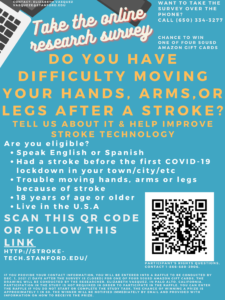
Bill 2:12
But for now let’s dive right into today’s episode. This is Episode 153 and my guest today is Elizabeth Vasquez. Elizabeth is a mechanical engineer and a third year PhD student who is right now recruiting stroke survivors to her research project which aims to develop technology that will help with rehabilitation of limbs, and most importantly will be low-cost so that it can be accessed by stroke survivors that did not have the means to afford expensive solutions that are on the market already.
Bill 2:48
So please listen to this episode and reach out to Elizabeth if you would like to be interviewed and helped with this project. All the links will be available in the show notes which can be found by going to recoveryafterstroke.com/episodes.
Bill 3:06
Elizabeth Vasquez welcome to the program.
Elizabeth 3:09
Thanks for having me.
Bill 3:10
Hi, thanks for reaching out. Because I love helping people and you’re somebody who’s studying. And you are looking for people to help you do some research and further your studies. And you reached out to me because of the podcast and because of the fact that I speak to stroke survivors. But before we get into that part of it, tell me a little bit about you and how you got to be researching and studying in this field?
Elizabeth 3:41
Yeah, so my name is Elizabeth Vasquez. I’m from a small border town in South Texas. Oh, Brownsville, Texas. Basically, this is kind of an underserved medically underserved area. So I grew up around less affluence than other areas.
Elizabeth 3:58
I went to undergrad at MIT. So I went from South Texas to Boston, it was a big cultural shock for me, I learned a lot of wonderful things and decided that I was really excited about research, I really wanted to help people, and so I came to Stanford University, and I’m currently a rising third-year PhD student here at Stanford.
Elizabeth 4:19
And the reason I’m interested in stroke in particular is because actually, when I first started here, someone in my family had a stroke. And it was in that moment that I realized there isn’t really a lot of support that at least that I felt, particularly for people who might not have the resources to be able to afford therapies, there isn’t really a lot that’s available to them. And so I kind of decided to make this my PhD project is kind of to make low cost rehabilitative technology for a stroke survivors.
Bill 4:49
You came to study in this field, in a similar way to a lot of other people that I’ve spoken to who study in the field of supporting stroke survivors in some way, shape, or form. Who was the person that, you know, that had a stroke?
Elizabeth 5:04
My father, actually.
Bill 5:06
Wow. Okay, so that would have been a big shock for the family. How old were you when he had a stroke?
Elizabeth 5:13
I think I must have been it was very recently. So I think it was two years ago. So I was 21 or 22.
Bill 5:20
Right. Okay. So what are some of the feelings that you felt when your dad had a stroke, and you didn’t have the tools and resources to support him? What does a child go through when their dad has a stroke?
Elizabeth 5:35
Well, I’m at this point, like I said, I was in my 20s. So I was a little bit older, which I think was nice. But I think it’s just very shocking and scary, because strokes present very differently.
Elizabeth 5:50
And I think you always hear Oh, you know, your face starts going numb or something, that’s a stroke. But for my father, it was the case that his vision started to blur up. And so it wasn’t clear that it was really a stroke, until we found out that it was, it was really scary because things like for example, in his case, he was very forgetful.
Elizabeth 6:13
He was forgetting things, he didn’t know who I was, or I guess where he was. That’s a very scary thing. And I think, for me, one thing I didn’t mention in the intro is that I’m a mechanical engineer. And so I like solving problems. I like being able to find a solution. And it’s really hard to sit there and feel helpless, like there is no solution to this that I can come up with right now.
Elizabeth 6:38
I just have to wait and hope that it gets better and hope that, you know, in the moment, when he’s in the hospital, we have no idea if it’s going to get worse, if it’s going to get better. No one can tell you how long it’s going to be. It’s very ambiguous. And it’s very unclear what’s going to happen next. And that’s very scary.
Bill 6:55
And it’s disempowering, isn’t it?
Elizabeth 6:57
Yeah, exactly, exactly. Especially I think as an engineer, I like to be able to, you know, I can solve it, I can fix it. But that’s not necessarily the case. In the moment, I really couldn’t.
Bill 7:10
Yeah, it’s not about applying logic to that problem and getting a solution that follows a natural path. And there’s a step to it, or there’s a process to it. There’s a chart you could follow. It’s not like that at all stroke is really, really challenging to handle. Does your dad live in the same border town in Texas that you did?
Elizabeth 7:33
Yes, Yes, he does. So he lives with my mom. And yeah, so they’re there together? I think the I suppose somewhat nice thing about it is his stroke kind of did not manifest in too many physical afflictions. But I think in a sense, that’s also additionally difficult because people might look at him and say, Oh, he’s totally fine. But he’s not.
Bill 7:59
Yeah. So as a result of the stroke a couple of years ago, has your dad been able to get back to work at this point, or get back to being himself in some way, shape or form? Or is he still having some challenges that he’s needing to manage?
Elizabeth 8:16
Yeah, he definitely still has challenges that he’s trying to manage. But he’s gotten to a state where he can go back to work, which is really, really incredible. But yeah, he definitely has difficulties with certain things.
Elizabeth 8:33
Some things take a little bit longer than they used to. And I think some things are frustrating, because when you look back at what you used to be able to do and what you can do now, it’s really hard, I think, to sometimes be able to see the progress. So I think that’s something he struggles with as well.
Bill 8:48
Now, how old was your dad at the time?
Elizabeth 8:54
He was in his 60s. And hopefully he doesn’t see this and not know that I don’t remember his exact age, but he was definitely in his 60s.
Bill 9:04
60s is fine. I mean, he’ll appreciate that. Sometimes people forget things. So it’s all right, don’t worry about it. So he’s in his 60s and what services did he have available to him in this border town near Texas? Sounds like there wouldn’t have been too much. Because it sounds like it’s a rural area. Would that be right?
Elizabeth 9:27
And so technically, it’s semi-rural. But so he actually had his stroke here at Stanford when he was dropping me off in grad school, which was, I guess, a blessing and a curse at the same time. So he got to come to Stanford hospital, and it’s one of the best in the country, which is really great.
Elizabeth 9:47
But I think once he got back to South Texas, there isn’t really a big Stroke Center, for example. And one thing that I think is troubling, I think one thing that I realized is he needed to go to someone who focused on neurology.
Elizabeth 10:05
And in order to do that he has to drive all the way to Houston, which is a multiple hour drive just to see a doctor who can kind of see him for that, which I think, luckily, my family is in a situation where like, that is possible. But I think for some people, a lot of people in my community, that’s not really an option.
Bill 10:25
It definitely isn’t. Oh, we’re from a Greek background. So the people that are come across if you have had a stroke, or from a background that English is not their first language really also then struggle with communicating their needs, or understanding the issues that they need to overcome.
Language issues
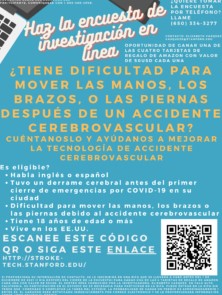
Bill 10:44
And then the doctors also have a hard time getting the message across. Does your dad have English as his first language? Or is there also a information sort of issue there because of English not being his first language?
Elizabeth 10:59
Yeah, so English is not his first language. Spanish is his first language. But he’s speaks English very well. I think he speaks English better than Spanish at this point. So he’s been okay in that front.
Elizabeth 11:11
But I know that the large majority of people in the community where I come from Spanish is definitely their primary language. And I think a lot of kind of what you’re speaking to is that a lot of the services that are available are available in English primarily. And even if they do translate it, translation is not always great.
Intro 11:31
If you’ve had a stroke, and you’re in recovery, you’ll know what a scary and confusing time it can be, you’re likely to have a lot of questions going through your mind. Like, how long will it take to recover? Will I actually recover? What things should I avoid in case I make matters worse, or doctors will explain things, but obviously, you’ve never had a stroke before, you probably don’t know what questions to ask.
Intro 11:55
If this is you, you may be missing out on doing things that could help speed up your recovery. If you’re finding yourself in that situation, stop worrying, and head to recoveryafterstroke.com where you can download a guide that will help you it’s called the seven questions to ask your doctor about your stroke.
Intro 12:14
These seven questions are the ones bill wished he’d asked when he was recovering from a stroke, they’ll not only help you better understand your condition. And they’ll help you take a more active role in your recovery, head to the website. Now, recoveryafterstroke.com and download the guide, it’s free.
Bill 12:33
Not only is information lost in translation, it’s also lost because the stroke survivor is going through a neurological problem. And it’s sometimes extremely difficult to take information on. And to put that into memory and to remember what it is that you’re being told or that you need to know about your condition.
Bill 12:55
So you’re really motivated, right? You’ve got a lot of motivation to help out in some way, shape or form, obviously, it’s gonna hopefully benefit your dad, but then it’s going to benefit the greater community as well.
Dedication to helping others – Elizabeth Vasquez
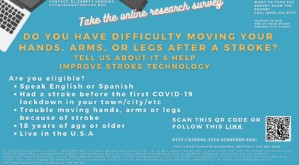
Elizabeth 13:10
Yeah, yeah, definitely, the plan here is to basically dedicate the next three years of my life to making something that is useful and helpful to people. And so that’s why the goal here is to make something that’s useful to kind of everyone. So focusing on lowcost at-home rehabilitative start technology.
The Ph.D. Project – New Tools For Stroke Survivors
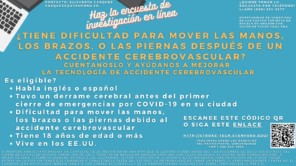
Bill 13:31
Awesome. Tell me about the PhD project, what it’s called, and then I know you’re looking for people to come on board to volunteer their time. So we’ll talk about that as well. But tell me about the PhD project first, what is it called?
Elizabeth 13:47
Yeah, so I’m doing mechanical engineering PhD. And so we got to get to pick the project that we want to do. Thankfully, I am funded by NSF.
Bill 14:00
Who’s the NSF?
Elizabeth 14:02
The National Science Foundation in America. So I’m being funded through them. And so the project is really all about being able to ask people what it is that they need. And then based off of that information of what people say that they need, for specifically physical therapy, I want to be able to provide some sort of at-home low-cost rehabilitative stroke technology, to help people so that they can get as much therapy as possible, regardless of their socioeconomic status, or how much money they have or if they’re in a rural area.
Elizabeth 14:37
So that’s kind of the long term goal is to be able to create physically build something and then test it. So make sure that it’s like clinically valid. That’s the goal for the next three years. And so the first step of that is going to be this survey that I’m currently doing right now, which is what I am seeking participants for.
Elizabeth 14:56
The survey itself is basically the idea is to ask people both well served and underserved stroke survivors, what it is that they want, what it is that they need, and then kind of to be able to from this first work, I’d like to be able to provide recommendations for other people who might be trying to build stroke technology, kind of give them some guidelines, maybe some design constraints about what is important and what matters here.
Elizabeth 15:23
And so for the survey itself, I’m looking for people who have difficulty doing the things that they would like to be able to do with either their hands, arms or legs, you do need to be able to speak either English or Spanish. So the survey is available online in either English or Spanish.
Elizabeth 15:42
I’m looking for people who had their first stroke before the first COVID-19 lockdown in their area, you need to be 18 years of age or older, as well. And you need to currently be living in the United States. And so if those are the cases, then someone would be eligible.
Elizabeth 16:01
And I have a flyer and a QR code and a link to take an online survey to kind of just kind of give me your experiences about what your experience has been with rehabilitation, the kinds of technologies you use, kind of how satisfied you are with all of that. And from that, I want to be able to start building a device that would be helpful and useful for people.
Elizabeth 16:22
It’s completely online. So you can just follow the link, it’ll take you to a Qualtrics survey. And you can just fill it out at your own pace, you can pause it and continue it however fast you would like. And then there is an opportunity at the very end to say if you would like to possibly participate in a follow up interview, then you can select that option. And then I’ll kind of randomize the people who said yes, and you may be contacted for a follow up interview, which would also be for this study.
How to get involved in the Stroke recovery research
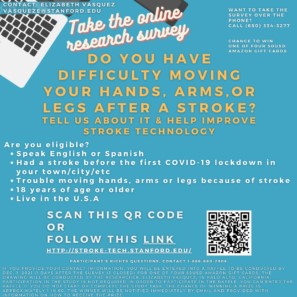
Bill 16:51
Excellent. And in the first instance, how do people get in touch with you? Where would they go to get in touch with you and say that they would love to be involved in this study?
Elizabeth 17:04
Yeah. So you can send me an email to my Stanford email, which is my last name and my first initial @stanford.edu. So that’s [email protected]. And in addition, I have some flyers, recruitment information, social media, possible social media posts. So if you send me an email, I can send you any of those things. And you can get in contact with me and I can send you the link to the survey.
Bill 17:33
Excellent. So when you get this information, how many people do you hope to get it from first? How many people you’re looking for?
Elizabeth 17:47
Yeah. So I would ideally like to get at least maybe 60 more participants who’d be willing to fill out my survey, the more the merrier. So I will not be as many people as are willing and eligible to participate, I would love to have you. Again, it’s just an online service. You don’t have to come in person or anything like that. You can do it at home, you can do it on your phone, you can do it on your computer.
Bill 18:22
And can people zoom with you and meet with you beforehand? If they have any questions? Or if they’re having difficulty filling out the form either in English or in Spanish?
Elizabeth 18:31
Yeah, actually if they don’t have internet, then they can also call the number that’s on the flyer itself. And then I can fill it out with them. But yeah, if they have any questions, or they want to know anything more about the survey that I haven’t listed here to help them decide, then they can go ahead and send me an email.
Elizabeth 18:50
And actually the phone number that they can call if they are interested in filling out the survey over the phone, or as well, if they have questions is 650-334-3277.
Bill 19:04
Fantastic. I am going to have all of that information at the top of the transcript of this podcast episode. So anybody who wants to get in touch with Elizabeth can go there and get those numbers direct, and then get in touch with Elizabeth either via the phone number, the email address, we’ll have a link hopefully to the form as well, where you can directly go and get the form and download the form.
Bill 19:33
You can reach out to me if you get stuck in you need any questions answered. And then I could fold them on to Elizabeth. So I think we’ve covered everything. I really look forward to being involved in that follow up and finding out how your project is progressing and how you’re going with the recruitment process and what you’ve been able to achieve and where you might need maybe some more help.
Bill 20:01
A little bit of a reminder, perhaps we can do another chat in the future. I really thank you for reaching out to me, firstly, I really appreciate the fact that you’re doing this project and looking out for other stroke survivors, that is an amazing thing to be doing.
Bill 20:17
And I appreciate that for you. It’s close to home. So you really want to make a difference for your dad. But you can see how it’s going to support other stroke survivors as well. I think that’s lovely. A lovely space to be working in.
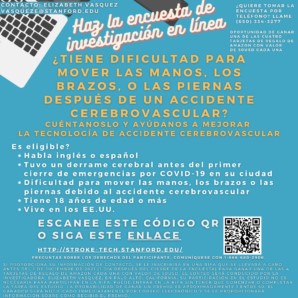
Elizabeth 20:30
Yeah, thank you so much. I mean, thank you for answering my messages and for giving me this time to kind of express all of this stuff. I really appreciate it.
Bill 20:40
Well, thanks so much for joining me on today’s recovery after stroke podcast. If you ever wish there was just one place to go for resources, advice and support in your recovery. And if you’ve been navigating your journey for weeks, months or years, I know firsthand how difficult it can be to get the answers you need.
Bill 21:01
This road is both physically and mentally challenging from reclaiming your independence to getting back to work to rebuilding your confidence and more. The symptoms don’t follow a rulebook, and as soon as you leave the hospital you no longer have medical professionals on tap.
Bill 21:17
I know for me It felt as if I was teaching myself a new language from scratch with no native speaker in sight. If this sounds like you, I’m here to tell you that you are not alone and there is a better way to navigate your recovery and build a fulfilling life that you love.
Bill 21:32
I’ve created an inclusive, supportive and accessible membership community called recovery after stroke. This only one support and resource program is designed to help you take your health into your own hands.
Bill 21:46
This is your guidebook through every step in your journey from reducing fatigue, to strengthening your brain health, to overcoming anxiety and more. To find out more and to join the community just head to recoveryafterstroke.com
Intro 22:00
importantly, we present many podcasts designed to give you an insight and understanding into the experiences of other individuals that pinions and treatment protocols discussed during any podcast are the individual’s own experience and we do not necessarily share the same opinion nor do we recommend any treatment protocol discussed.
Intro 22:17
All content on this website and any linked blog, podcast or video material controlled this website or content is created and produced for informational purposes only and is largely based on the personal experience of Bill Gasiamis the content is intended to complement your medical treatment and support healing.
Intro 22:34
It is not intended to be a substitute for professional medical advice and should not be relied on as health advice the information is general and may not be suitable for your personal injuries, circumstances or health objectives. Do not use our content as a standalone resource to diagnose treat, cure or prevent any disease for therapeutic purposes or as a substitute for the advice of a health professional.
Intro 22:55
Never delay seeking advice or disregard the advice of a medical professional, your doctor or your rehabilitation program based on our content. If you have any questions or concerns about your health or medical condition, please seek guidance from a doctor or other medical professional if you are experiencing a health emergency or think you might be call 000 if in Australia or your local emergency number immediately for emergency assistance or go to the nearest hospital emergency department.
Intro 23:19
Medical information changes constantly. While we aim to provide current quality information in our content. We did not provide any guarantees and assume no legal liability or responsibility for the accuracy, currency or completeness of the content. If you choose to rely on any information within our content you do so solely at your own risk. We are careful with links we provide. However third party links from our website are followed at your own risk and we are not responsible for any information you find there.






